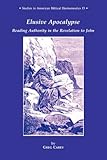Elusive Apocalypse : reading authority in the Revelation to John / by Greg Carey. [print]
Material type: TextSeries: Studies in American biblical hermeneutics ; 15.Publication details: Macon, Georgia : Mercer University Press, (c)1999.Description: xiv, 209 pages ; 23 cmContent type:
TextSeries: Studies in American biblical hermeneutics ; 15.Publication details: Macon, Georgia : Mercer University Press, (c)1999.Description: xiv, 209 pages ; 23 cmContent type: - text
- unmediated
- volume
- 9780865546325
- BS2825.C273.E487 1999
- BS2825
- COPYRIGHT NOT covered - Click this link to request copyright permission:
| Item type | Current library | Collection | Call number | Status | Date due | Barcode | |
|---|---|---|---|---|---|---|---|
 Circulating Book (checkout times vary with patron status)
Circulating Book (checkout times vary with patron status)
|
G. Allen Fleece Library CIRCULATING COLLECTION | Non-fiction | BS2825.2.C374.A663 1999 (Browse shelf(Opens below)) | Available | 31923001689187 |
Editor's preface Charles Mabee -- Authority of and in the Apocalypse -- Narrative ethos: reading authority -- Apocalyptic ethos -- John's narrative ethos: self-representation -- John's narrative ethos: representation of opponents -- Negotiating ethos? -- Bibliography -- Index of ancient texts.
In Elusive Apocalypse Greg Carey examines how the Book of Revelation constructs narrative and religious authority through "John," its ever-present narrative voice. Tensions within Revelation's construction of narrative and religious authority fuel conflicts over its interpretation. Analysis of popular and scholarly readings of the Apocalypse, complemented by autobiographical reflection, reveals that authority is a critical issue for contemporary interpreters. As John articulates his own authority, he must also silence competing voices from the empire, the larger society, local Jewish communities, and even some members of his audience. Carey proposes narrative ethos as a model for evaluating John's rhetoric. Taken together, the resources of classical rhetoric, modern literary analysis, and postcolonial criticisms elucidate how ancient apocalyptic visionaries like John legitimated their radical claims. Revelation stands in liminal territory. it embodies resistance to oppressive structures on the basis of an egalitarian vision, calling all "servants" of God to join John in his resistance. To share with John, however, means to subordinate oneself to his vision. Somewhere between partnership and domination the readers of the Apocalypse also stand. They must decide whether and how to respond to this extraordinary vision. ~ Back cover.
COPYRIGHT NOT covered - Click this link to request copyright permission:
There are no comments on this title.
